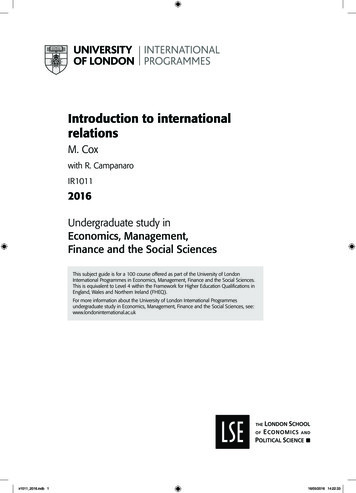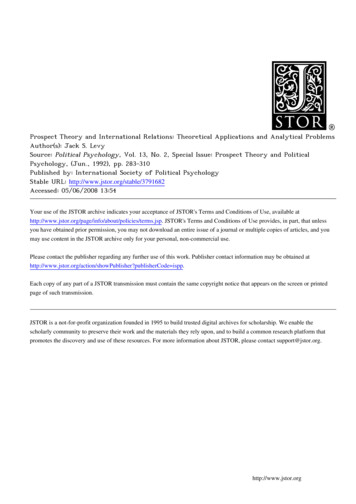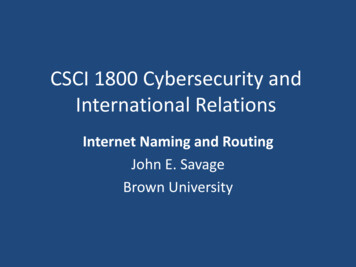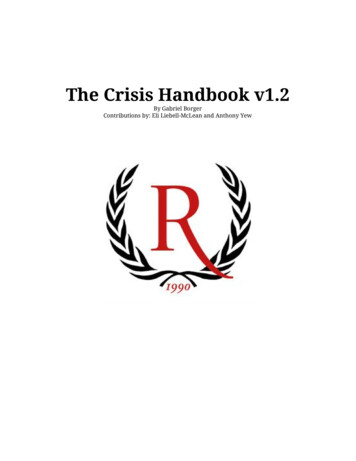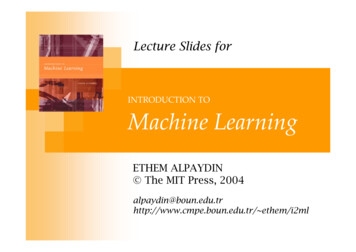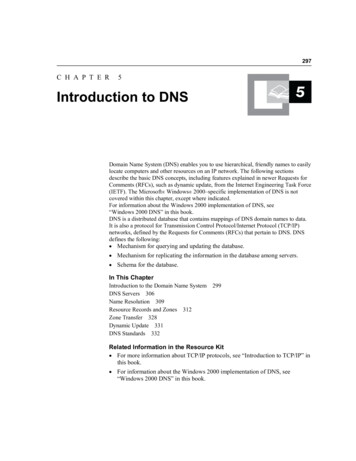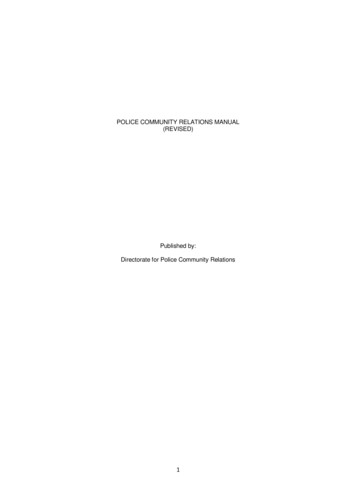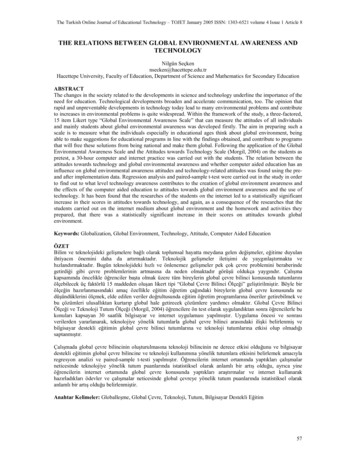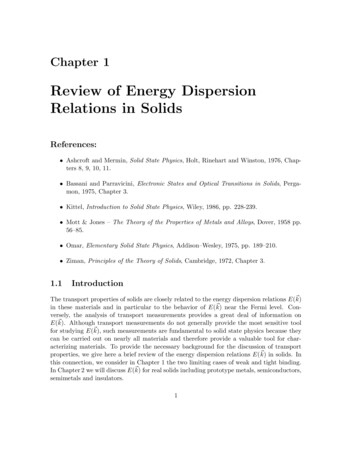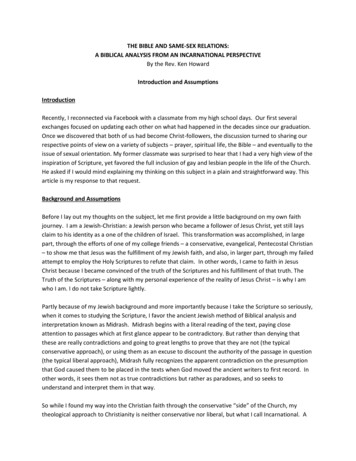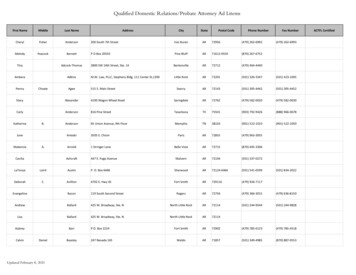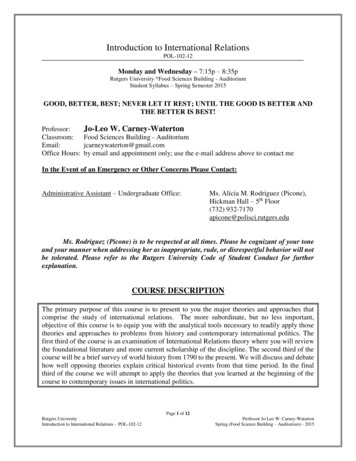
Transcription
Introduction to International RelationsPOL-102-12Monday and Wednesday – 7:15p – 8:35pRutgers University *Food Sciences Building - AuditoriumStudent Syllabus – Spring Semester 2015GOOD, BETTER, BEST; NEVER LET IT REST; UNTIL THE GOOD IS BETTER ANDTHE BETTER IS BEST!Professor:Classroom:Email:Office Hours:Jo-Leo W. Carney-WatertonFood Sciences Building - Auditoriumjcarneywaterton@gmail.comby email and appointment only; use the e-mail address above to contact meIn the Event of an Emergency or Other Concerns Please Contact:Administrative Assistant – Undergraduate Office:Ms. Alicia M. Rodriguez (Picone),Hickman Hall – 5th Floor(732) 932-7170apicone@polisci.rutgers.eduMs. Rodriguez (Picone) is to be respected at all times. Please be cognizant of your toneand your manner when addressing her as inappropriate, rude, or disrespectful behavior will notbe tolerated. Please refer to the Rutgers University Code of Student Conduct for furtherexplanation.COURSE DESCRIPTIONThe primary purpose of this course is to present to you the major theories and approaches thatcomprise the study of international relations. The more subordinate, but no less important,objective of this course is to equip you with the analytical tools necessary to readily apply thosetheories and approaches to problems from history and contemporary international politics. Thefirst third of the course is an examination of International Relations theory where you will reviewthe foundational literature and more current scholarship of the discipline. The second third of thecourse will be a brief survey of world history from 1790 to the present. We will discuss and debatehow well opposing theories explain critical historical events from that time period. In the finalthird of the course we will attempt to apply the theories that you learned at the beginning of thecourse to contemporary issues in international politics.Page 1 of 12Rutgers UniversityIntroduction to International Relations – POL-102-12Professor Jo-Leo W. Carney-WatertonSpring (Food Science Building – Auditorium) - 2015
COURSE PERFORMANCE OBJECTIVESAt the end of this course you should have a strong grasp of the: Various theories of state behavior and how they apply to current and past political events. The causes of war and other forms of conflict, such as ethnic conflict. How non-state actors such as international organizations can affect the actions of states. How and why cooperation occurs in the international system. The issues that concern international relations today and how they shape the foreign policydecisions of states.Course Materials Selected readings posted online or sent to you by e-mail.DANIEL DREZNER, THEORIES OF INTERNATIONAL POLITICS AND ZOMBIES, PP., THEORIES OFINTERNATIONAL POLITICS AND ZOMBIES (PRINCETON: PRINCETON UNIVERSITY PRESS, 2011).JEFFRY FRIEDEN, DAVID LAKE, AND KENNETH SCHULTZ, WORLD POLITICS: INTERESTS,INTERACTIONS, AND INSTITUTIONS, 1ST EDITION (NEW YORK: W.W. NORTON, 2009).ROBERT ART AND ROBERT JERVIS (A&J), INTERNATIONAL POLITICS: ENDURING CONCEPTS ANDCONTEMPORARY ISSUES, 11TH EDITION (NEW YORK: PEARSON LONGMAN, 2012). You do not haveto purchase this book as I will provide the articles from it you will need to read for the course.College Level Dictionary/College ThesaurusNotebook for class notespocket folder to keep all your workMicrosoft Word and access to a computerworking e-mail accountUSB/Flash driveAt least one blue pen and or black pen and pencil. The blue pen is preferable.AttendanceYou must not only attend every class, but also be on time, be prepared (all reading or writingassignments completed), and take an active part in class (which includes active listening). Failingto do all of these things creates an unacceptable hindrance to your fellow students and to me. Ifyou arrive a minute late you will receive a tardy for the class. Three tardies will count as oneabsence. If you are more than 30 minutes late to class you will be marked absent for that class.Despite this fact, you are still strongly encouraged to come to class because it is more advantageousfor you not to miss the class in total. Moreover, once you arrive you are expected to remain for theduration of class. Leaving class early or getting up in the middle of class is considered disruptivebehavior and will result in an absence for the class; this includes leaving to use the restroom or toanswer your cell phone. Therefore, please use the restroom and/or make and answer all phone callsbefore you come to class. If you must leave early I will excuse the early departure if it is aqualified emergency.Page 2 of 12Rutgers UniversityIntroduction to International Relations – POL-102-12Professor Jo-Leo W. Carney-WatertonSpring (Food Science Building – Auditorium) - 2015
If you are unable to attend class you must contact me, or preferably, another student in theclass (via e-mail) regarding missed work. If you miss class you are still responsible for notes,assignments, quizzes, and papers on the missed day and the following class. Work not submittedon time is considered late and is reduced by one whole letter grade down from the grade that youwould have otherwise received for every day that it is late.If you are absent more than four times during the semester you will be marked down onewhole letter grade from your final grade for the class. Only extreme and or extraordinarycircumstances will justify an excused absence. Absences due to regular illness, appointments, jobs,and so on, are not excused. Late work due to such reasons incurs a late penalty. Absences in thecase of religious observances*, mandatory court appearances, incarceration, or hospitalization areexcused (official documentation required). Late work for these reasons is not penalized.You should note that there will be times when I am late for class, it is a work of the inevitable;however, absent any indication from me, faculty/administrative official, you may leave the classat half past the hour. I will make every effort to inform you beforehand if I am going to be lateto class.*Religious observances refer to nationally or universally recognized days of observance also recognized by Rutgers University.If you are absent from class you MUST report that absence through the University’s StudentSelf Reporting Absence Application system.Add/Drop Procedures and PeriodsIf for any reason you decide not to continue with the course you must formally withdrawthrough the registrar’s office. Do not assume that the registrar will “remove” you from the coursesimply because you no longer attend. If you stop attending my class, but do not formally withdrawwith the registrar by March 24, 2015, I will record an “F” as your final grade for the course. Pleasenote the following dates:January 28, 2015 – Last day to Drop and receive a full refund.March 23, 2015 – Last day to Withdraw and receive a “w”.April 20, 2015 – Last day to withdraw from the University for the spring 2015 semester. Youcannot withdraw after this date and an “F” will be recorded for you if fail to continue coming toclass.Page 3 of 12Rutgers UniversityIntroduction to International Relations – POL-102-12Professor Jo-Leo W. Carney-WatertonSpring (Food Science Building – Auditorium) - 2015
GradingYour grade for this course consists of the following:Unit I and II Examinations – 75%International Relations Analytical Essay – 10%Foreign Policy Journal – 10%Pre-Unit Examination Quizzes – 5%Please note that there is no final examination for this course.The raw grade that you receive for the course will be what is recorded and transmitted to theregistrar. I do round grades within the whole letter grade, but not to the next whole letter grade.For instance, if you earn a 74.5 in the class I will round that grade to a 75 so that your final gradefor the course would be a C instead of a C. If you earn a 79.5 your final grade will be a C , nota B. The same is true of your grade for your examinations and all submitted assignments.Though you will not be graded on your class participation or attendance per se, if you are absentmore than four times during the semester your final grade for the class will be reduced by onewhole letter grade for every day you are absent beyond your allotted four absences. For instance,if your final grade for the class is a C and you missed five days of classes, your final grade forthe class will be a D.Please note that I do not give grades, I record them. As such, the grade that I record for your semesterperformance is non-negotiable. I will not make any changes to the final grade unless you cansuccessfully prove that I have made a computational error. You are expected to perform with anexceptionally high degree of excellence, and for that reason I do not normally offer extra credit. Itshould be noted that I am not your Professor per se, but a facilitator of learning. I merely dispenseknowledge and it is your responsibility to acquire it, assimilate it, and appropriate it accordingly. Inshort, your academic achievement in this class is largely up to you. Please remember that if you failthis course I take none of the blame; however, if you pass this course I take none of the credit.Academic HonestyYou are expected to do your own work. Dishonesty in fulfilling any assignment underminesthe learning process and the integrity of a college degree. Engaging in dishonest or unethicalbehavior is forbidden and will result in disciplinary action, specifically a failing grade for thecourse and a report to College officials. Such behavior includes Cheating – an act of deception by which a student misleadingly demonstrates that s/he hasmastered information on an academic exercise. Examples are copying someone’s work orallowing another to copy your work; using unauthorized materials during a test (notes, books,computer media, text messaging), communicating during a test in any way with anyone otherthan the test administrator, or submitting a paper or major portions of a paper that has beenpreviously submitted for another class.Page 4 of 12Rutgers UniversityIntroduction to International Relations – POL-102-12Professor Jo-Leo W. Carney-WatertonSpring (Food Science Building – Auditorium) - 2015
Plagiarism – representing the work of another as one’s own without giving credit. Failure toproperly cite the materials you used to write your essay constitutes plagiarism. Facilitation of Academic Dishonesty – Knowingly or negligently allowing one’s work to beused by another or otherwise aiding others in academic dishonesty Please refer to the Rutgers University Student Code of Conduct for additional information regardingAcademic Honesty and College regulations.Student AccommodationsIf you need any reasonable accommodations, and have received a letter of accommodationfrom your Office of Disability coordinator, please see me to discuss this matter. If you have adisability but do not have a letter of accommodation please visit the Office of Disability Servicesimmediately to receive one. Without a letter of accommodation you will be required to take allexaminations and submit all assignments in the same manner as any other student in the class.Class ParticipationLearning involves a constant flow of information between teacher-student, student-teacher, andstudent-student. I prefer that everyone speak up in class so I know you are awake. This is, however,not an encouragement of you asking inane questions or making comments merely to show off orchallenge me or the Teaching Assistants for challenge sake. Gathering information outside of theclassroom that pertains to foreign affairs will greatly improve your class participation. You cankeep abreast of international politics throughout the semester by doing some or all of the following: Read a newspaper at least a few times a week. I recommend the New York Times, the WallStreet Journal, the Washington Times, The Newark Star Ledger, or the Washington Post. Watch a TV news program that covers national politics news (ABC, NBC, CNN, BBC, or TheNews Hour with Jim Lehrer). Read news and political magazines, such as Newsweek and U.S. News and World Report.Political magazines are available that span from the left (The Nation) to Clinton-New DealDemocrat Liberal (The New Republic) to the right (National Review). Watch C-SPAN or C-SPAN-2, the networks that provide coverage of Congress in action. Thesestations also cover other political events of interest. On Washington Journal, C-SPANsmorning program, the hosts and guests discuss the day's headlines.Page 5 of 12Rutgers UniversityIntroduction to International Relations – POL-102-12Professor Jo-Leo W. Carney-WatertonSpring (Food Science Building – Auditorium) - 2015
Class Projects and Homework1Foreign Policy JournalYou are required to select a foreign policy issue of contemporary interest to analyze over the courseof the semester. A policy topic proposal is due by the second full week of class (February 2, 2015)so scour newspapers and other media sources to find a foreign policy issue that interests you. Youwill submit your proposal to me in writing using the proposal form that I will provide you with viae-mail or my website. You must make a journal submission at least twice a week referencing anarticle that addresses the issue that you have chosen to cover. Your journal should include at leastthe following elements: academic readings on the policy, news coverage of your policy,examination of the stakeholders involved, and analysis that links course content to your policy.The format of the journal is somewhat flexible, so be creative! You will find instructions on howto complete your twice weekly journal submission on my website. You must submit your journalassignment to me on the specified date, which will likely be a date at least one week from the endof the semester. Specific instructions on your final submission will be released to you no less thanfive days before your final submission is due.Analytical/Persuasive EssaysYou are required to submit one analytical/argumentation essays in this class. I will provide youwith the prompt for the essay two weeks before they are due. When writing your essay make sureto use Times New Roman, 12-point font, standard sized margins, and proper citation format. Whatcitation form you choose is up to you, but it should be consistently applied throughout the essay.Additionally, please number each page. The page number should be at the bottom of the essaypage, centered. Your essay must include a works cited page. Your margins must be “justified”,meaning that the text is distributed evenly between the margins. If using Microsoft Word you willfind this feature on the home ribbon in the paragraph section. If you do not know how to “justify”your margins in Word please take the time to look up that function before submitting your work.Your text should always be double spaced within the paragraphs but not between the paragraphs.Your work must be submitted with a cover page unless otherwise instructed. This heading mustbe placed in the center of the cover page and typed in Times New Roman, 12-point font. Theheading must be in the following form:Your NameIntroduction to International Relations – POL 102-12Professor J. Carney-WatertonSeptember 1, 2014212I will provide you with more specific instructions before the beginning of the assignment.Your date must be written in this format as no other format will be accepted or be appropriate.Page 6 of 12Rutgers UniversityIntroduction to International Relations – POL-102-12Professor Jo-Leo W. Carney-WatertonSpring (Food Science Building – Auditorium) - 2015
Essays will be graded on content, structure, and mechanics. The following elements are part of,an A paper:1. A clear thesis presented in the first paragraph and argued throughout. Do not tell me whatyou are going to argue, state your thesis clearly.2. Evidence to support your thesis in the form of “facts,” ideas from existing research, andthoughtful, balanced analysis.3. A bibliography/works cited page with a complete list of your sources. You must use atleast three different authors and library sources. Avoid using all Internet sources, andmake sure that the Internet citations you use are not from an advocacy site or other lessreliable source.4. Clear writing with very, very few grammatical errors. There will be little in the way of traditional homework; however, I reserve the right to givehomework if it is clear that you are not grasping certain concepts and or not applying yourselfappropriately. Collected assignments submitted late are reduced by 50%. An unexcused absence does notexcuse this penalty.ExpectationsI expect you to: Take responsibility for your learning Come to class prepared (with all books and supplies) Do your homework on time and according to the instructions provided** Take appropriate notes and do in-class activities Participate either by paying attention and/or contributing to class discussion Study for quizzes and tests See me about your individual progress or for extra help Refrain from disrupting the lesson – this includes being silent when I am lecturing* sticking to the lesson when working in a pair or small group* refraining from unnecessary conversation* turning off cell phones, pagers, and portable music devices* refraining from using these during class, including text messaging* refrain from the use of the computers unless otherwise instructed* Remain in class during the class time*Take care of personal hygiene before or after class.Refrain from bringing food into the classroom. You may bring water (and that is all) as longas you keep the lids or caps on and keep them away from the computers.Page 7 of 12Rutgers UniversityIntroduction to International Relations – POL-102-12Professor Jo-Leo W. Carney-WatertonSpring (Food Science Building – Auditorium) - 2015
*If you fail to meet these expectations you will be asked to rise, leave, and you will be markedabsent for the day.**If homework is not complete or in the form instructed, the work is consider late and will resultin a failing grade for the assignment and dismissal from the class.Dress Code and Personal Hygiene/GroomingRutgers University does not maintain a formal dress code, however; you should note thatcertain attire is not acceptable in the classroom. Please do not wear pajamas or any other bedroomattire in the classroom including bedroom slippers (house shoes). Please refrain from wearing anygang related clothing or accessories that could lead law enforcement or other students to believethat you are gang affiliated. Additionally, please refrain from wearing any clothing that is overtlyand or patently offensive to any social group.Please come to class having attended to all of your hygiene and grooming need. Applyingmake-up in class, brush, combing, or otherwise styling your hair, etc., is not acceptable and if youare caught doing so you will be asked to leave. GENTLEMEN: YOU ARE NOT PERMITTED TOWEAR HATS OF ANY TYPE IN THE CLASSROOM ACCEPT IN RELIGIOUS OBSERVANCE.COURSE OUTLINE3Wednesday, January 20, 2014: Introduction - ReadingsSupplemental Reading: Relevance of the Westphalian System to the Modern World by SashaSafonovaAssignment: Download the articles listed under Part I and begin reading. You shouldalways read at least two to three article ahead to keep up in the class.PART I: PARADIGMS AND THEORIESWeeks of January 26th to March 11th: Theories and Core ConceptsJeffry Frieden, David Lake, and Kenneth Schultz, World Politics: Interests, Interactions, andInstitutions, 1st edition, pp. 41-50Daniel Drezner, Theories of International Politics and Zombies, pp., Theories of InternationalPolitics and Zombies, pp. 1-323This syllabus, its times and formats, are subject to change as time and circumstance require and with notice fromyour instructor.Page 8 of 12Rutgers UniversityIntroduction to International Relations – POL-102-12Professor Jo-Leo W. Carney-WatertonSpring (Food Scienc
Rutgers University Professor Jo-Leo W. Carney-Waterton Introduction to International Relations – POL-102-12 Spring (Food Science Building – Auditorium) - 2015 Introduction to International Relations POL-102-12 Monday and Wednesday – 7:15p – 8:35p Rutgers University *Food Sciences Building - File Size: 417KBPage Count: 12
